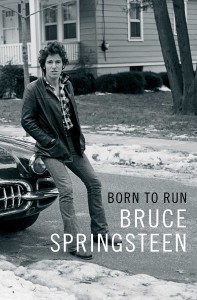by Colorado Review Associate Editor KT Heins
 I recently finished Born to Run by Bruce Springsteen on a flight back from Mobile, Alabama. My grandfather died on Sunday, January 15th in the evening, in his sleep. My father gave me Born to Run to read on the plane.
I recently finished Born to Run by Bruce Springsteen on a flight back from Mobile, Alabama. My grandfather died on Sunday, January 15th in the evening, in his sleep. My father gave me Born to Run to read on the plane.
As my father handed me the heavy, hardcover paperweight of a book, he said, “I know you don’t read books like this often. It was probably written by a ghost.” He seemed to be excusing the book before I opened it.
Bruce was a good Catholic boy hailing from the Northeast. My father was the same. Bruce gave me access to my father at a time in which my mother lost access to hers.
Published by Simon and Schuster, the book was written over the course of seven years by the boss himself. Simon and Schuster assured readers that there was no ghostwriter involved. All hail the powerful poetics of Bruce Springsteen. In most of the book’s reviews, it was insisted Springsteen wrote it himself—no ghost in sight. However, I began to wonder why this factoid had been included in every review. Would so many assume, like my father, that it had been ghostwritten?
Ghostwriters act as a medium not unlike those at séances. The story is transferred from the person who had the experience to the writer who transcribes, tailors, and rewrites it anonymously. Sometimes it’s considered a betrayal of the reader’s trust since the reader believes that the author on the cover is in fact the person writing the words, and they therefore assume this writer to be inspiring and all-powerful based on those words. Most likely, they know of the writer prior to this point.
It’s not a secret that one of the many jobs for us freelance writers is to ghostwrite blog posts or reviews on product websites, or to transcribe autobiographies. You can even get hired to run an individual’s Twitter account. These ghostwriting gigs are part of the deal. In the world of advertisement, where I worked prior to attending Colorado State University, this is the only writing a junior copywriter gets to do.
As a writer, running Twitter accounts, writing advertisements and product reviews, and editing manuscripts keep me employed. While it isn’t rewarding, it keeps me distracted from my own work which is a large, emotionally draining project that I’d rather not think about. I don’t think it is wrong to empower CEOs, celebrities, or companies with the ability to tell their stories, teach lessons, or sell products. While we could encourage them to learn to write themselves, it’s not a requirement in communication these days.
It may seem deceitful, but a writer has to eat, and people have to keep their heroes.
In the world of small publishing, ghostwriting isn’t a concern. At Colorado Review, we assume all manuscripts are written by those who submit them, partially because it takes a certain craft and personal experience to write a short story, poem, or essay, and because they want it to find a home with us, at a literary review. There’s no persona behind the story, no author more important than the words we publish. For a larger publishing house, there are different business models to consider when selling a book. Will the author become as well-known as their words? Or are they already well-known?
If the author is a celebrity or CEO, there is a certain amount of pressure in the publication of a book. The author comes with a fan base, and this fan base needs satisfaction while reading. In the world of advanced social media, fans have access to a person unlike ever before due to Twitter, Instagram, and Facebook. Publications must reassure them that their idol is in fact the person they want them to be by giving them what they need to hear. Colorado Review wants to satisfy readers, but we have no pressure to supply an author’s personhood, only their observations in fiction, poetry, and essays.
Springsteen’s book gave me emotional reprieve at a time when I needed it most; his story was fascinating and illuminated the long history of a rock ’n’ roll star that lit up my childhood. I can’t imagine the pressure he must’ve been under to supply a story that both reassured me that my childhood hero was still a hero, and revealed the darker parts of his life like his relationship with his father, or his manic depression.
Authorship is rapidly changing in a society in which who the author is may be more important to reader than the words they write.